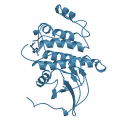
- Remove this product from my favorite's list.
- Add this product to my list of favorites.
Products
Newsletter
 |  |  |  |  |  |

Lck is a Src family kinase primary expressed in T cells. The modular structure is formed by an N-terminal tail, containing a dicysteine motif which is important for the constitutive interactions with the CD4 and CD8 molecules, a Src homology 3 (SH3) domain, a SH2 domain, the catalytic core and a C-terminal negative regulatory domain. During TCR-MHC/peptide interactions, Lck is recruited to the complex via association with either CD8 or CD4 coreceptors. After coligation of the TCR and the coreceptors, active Lck is proximally positioned to phosphorylate-specific tyrosine residues within ITAMs (immunoreceptor tyrosine-based activation motifs) located within the CD3 and TCR. The signal propagation leads to recruitment of ZAP-70 and Syk and finally to T cell activation. Lck plays also a role in the interleukin 2 (IL-2) signaling pathway that controls the T-cell proliferative response.
Protein: Human LCK, full length, amino acids M1-P509 (as in NCBI/Protein entry NP_005347.3), N-terminally fused to GST-HIS6-Thrombin cleavage site
Theoretical MW (Lck): 92.8 kDa (fusion protein)
Expression system: Baculovirus infected Sf9 cells
Purification: One-step affinity purification using glutathione agarose
Storage buffer: 50 mM Hepes, pH 7.5; 100 mM NaCl, 5 mM DTT, 4 mM reduced glutathione, 20% glycerol
Protein concentration: 0.140 mg/ml (Bradford method using BSA as standard protein)
Method for determination of Km value & specific activity: Filter binding assay MAFC membrane
Specific activity: 66,000 pmol/mg min
Entrez Gene ID: 3932
UniProtKB: P06239
Ordering information: shipped on dry ice
Zamoyska R, Basson A, Filby A, Legname G, Lovatt M, Seddon B. (2003) "The influence of the src-family kinases, Lck and Fyn, on T cell differentiation, survival and activation." Immunol Rev.;191:107-18.
Palacios EH, Weiss A. (2004) "Function of the Src-family kinases, Lck and Fyn, in T-cell development and activation." Oncogene. 18;23(48):7990-8000.
Isakov N, Biesinger B. (2000) "Lck protein tyrosine kinase is a key regulator of T-cell activation and a target for signal intervention by Herpesvirus saimiri and other viral gene products." Eur J Biochem. 267(12):3413-21.
Welcome Login
Contact us
Follow us